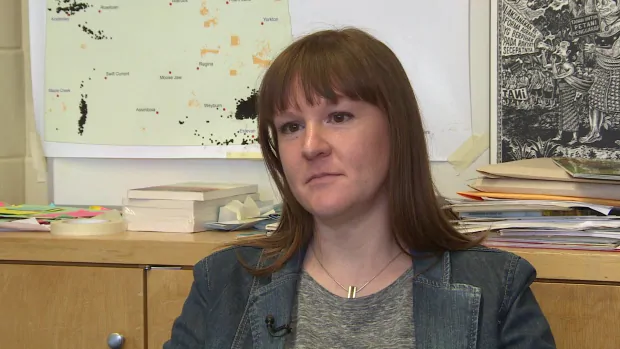Fossil fuel, climate change research 'being done in secret,' says university prof behind lawsuit

Academic freedom is at the heart of a court case between a University of Regina professor and her employer.
Emily Eaton is an associate professor in the department of geography and environmental studies at the U of R. As part of her research into the effects of the fossil fuel industry on Saskatchewan education, she submitted a freedom of information request to the U of R for the names of the private funders who donated money to research on oil, gas, coal and climate change.
The university refused.
The U of R says disclosing this information would scare off much-needed private donors and that it is defending academic freedom by protecting the ability of its academics to confidentially conduct controversial research.
Eaton is concerned the university is allowing research to be done in secret.
“They’re arguing that because energy research can be controversial, we shouldn’t have to disclose the name of funders in order to shield university researchers from a public controversy,” she said.
“Certainly the university should never fire anybody for pursuing their research whatever that might be. And nobody should be interfering with that research. But it doesn’t mean that research should be shielded from public discussion.”
‘Research being done in secret’
The Local Authority Freedom of Information and Protection of Privacy Act states the University of Saskatchewan, the University of Regina, or hospitals or health centres are allowed to refuse to share details of academic research, though they must share the title of the research and the amount of funding being received.
Eaton has also requested the identity of the funding agency and the funding recipient.
“I would maintain that if they’re not willing to do that … we’re basically green-lighting research being done in secret at academic institutions,” Eaton said.
“That’s a conversation that we haven’t had nationally about the capacity of private corporations to do research in secret at public institutions.”
A ‘chilling’ effect on research
In its statement of defence, the university said providing the identity of the funding agency and the funding recipient could have a “chilling” effect on research funding.
The U of R said researchers don’t want others to know who their funders are because they’re worried competing researchers will also ask those funders for support, which could reduce future investments.
In cases where research is being undertaken to develop “bleeding edge technology,” the university said a company finding out their competitor is undertaking certain research could be detrimental.
An example the university gives is that “Ford would be very interested to learn that Toyota has given a university $15 million to fund a research project into solar powered vehicles.”
In some cases, the U of R said, the funder is controversial, and disclosing who it is could create safety concerns, “and the possibility of protests or other steps to hinder, interfere with or prevent the progress of the research project,” reads the university’s statement of defence.
‘Threat to academic freedom’
Eaton said private contracts for research often have restrictive requirements, including being unable to publish the results depending on what you find.
“If they’re attaching strings to your funding, [the corporations] are actually a greater threat to academic freedom than disclosing that they’re funding it, as the university is arguing.”
The university said it will provide her with research files that have been made public and, for all other records, determine whether any exemptions apply.
Eaton agreed that there is likely research where it is reasonable to withhold this information but said that needs to be decided on a case-by-case basis.
Eaton received $24,000 worth of financial support for the court case, including $12,000 from the Canadian Association of University Teachers and $12,000 she raised privately.
Eaton and the U of R argued their cases Wednesday at the Court of Queen’s Bench. A decision is expected to come this summer.





